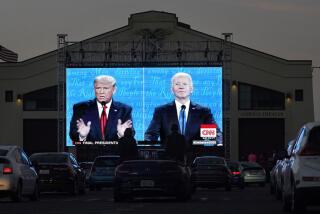Let Bush Be Bush
- Share via
ALEXANDRIA, VA. — The debates have concluded, and Texas Gov. George W. Bush, to the astonishment of the Gore campaign, has emerged as the front-runner going into the final stretch of the campaign. Gore’s campaign was convinced that Vice President Al Gore’s intellectual heft would overwhelm and bury Bush in the debates. Instead, Bush emerged as more likable, persuaded voters of his prowess on foreign affairs and demonstrated leadership and presidential stature.
In the final two weeks, perhaps 11 states will decide the outcome of the presidential race. On the West Coast, California, Washington and Oregon are still in play, which is bad news for Gore, since Democrats took these states in 1992 and 1996. In the Midwest, Michigan, Wisconsin, Missouri and Iowa are too close to call, as is Pennsylvania, another stunning blow to Gore. President Bill Clinton won both Kentucky and Tennessee in 1992 and 1996, but the Democrats have pulled their advertising in Kentucky, and Tennessee is dead even; so much for the home-state advantage. Florida remains a battleground but is trending toward Bush.
So what does Bush prepare for?
Gore’s strategy is clear: constantly attack and belittle Bush. Gore’s advertising since the second debate has been all attack, all the time. The problem for Gore is, he can’t seem to find an attack point that sticks. So far, the campaign has gone from prescription drugs to Bush’s record in Texas and now to Social Security.
In trying to win back blue-collar and union men who have moved over to Bush, Gore has gone back to the alpha-male persona he used during the Democratic National Convention. Bush is countering by stressing the need for bipartisanship and civility. He also trying to hold on to his support among moderate women, who his father and Bob Dole lost.
Next, Gore will get Clinton back on the campaign trail, scare seniors on Social Security, roar that he is fighting for Americans (while denying 50 million Americans any tax relief) and run attack commercials to the bitter end.
Bush has been more successful on two fronts. His passionate concern for education strongly appeals to baby-boomer women and plays well against Gore’s misstatement that “our public schools are excellent.” (Parents of kids in inner-city Los Angeles, San Francisco and San Jose probably wouldn’t agree with Gore.) Also, Bush simply is more likable than Gore, who sometimes comes across as the class bully who not only is a know-it-all but likes to get in your face when he tells you he knows it all. In two focus groups I conducted with undecided voters for “CBS Evening News,” women, in particular, were disenchanted with Gore’s aggressiveness. And a significant bloc of men were disgusted with Gore’s condescending answers and changing personalities.
The real surprise here is why Gore isn’t receiving any credit for the economy. The answer is, voters know that Gore has had nothing to do with the country’s stunning economic growth, and those who pay taxes resent being excluded from his tax-cut plan. They also worry that their taxes will go to bigger government.
Bush has a stealth strategy in play: California. The GOP team has spent $8 million in advertising over the past three weeks with no response from Gore. If Bush can stick with his theme of smaller government, emphasis on education with greater control at the local level and using the surplus to restore Social Security and Medicare, as well as to return money to all taxpayers, he should win. *
More to Read
Get the L.A. Times Politics newsletter
Deeply reported insights into legislation, politics and policy from Sacramento, Washington and beyond. In your inbox twice per week.
You may occasionally receive promotional content from the Los Angeles Times.










